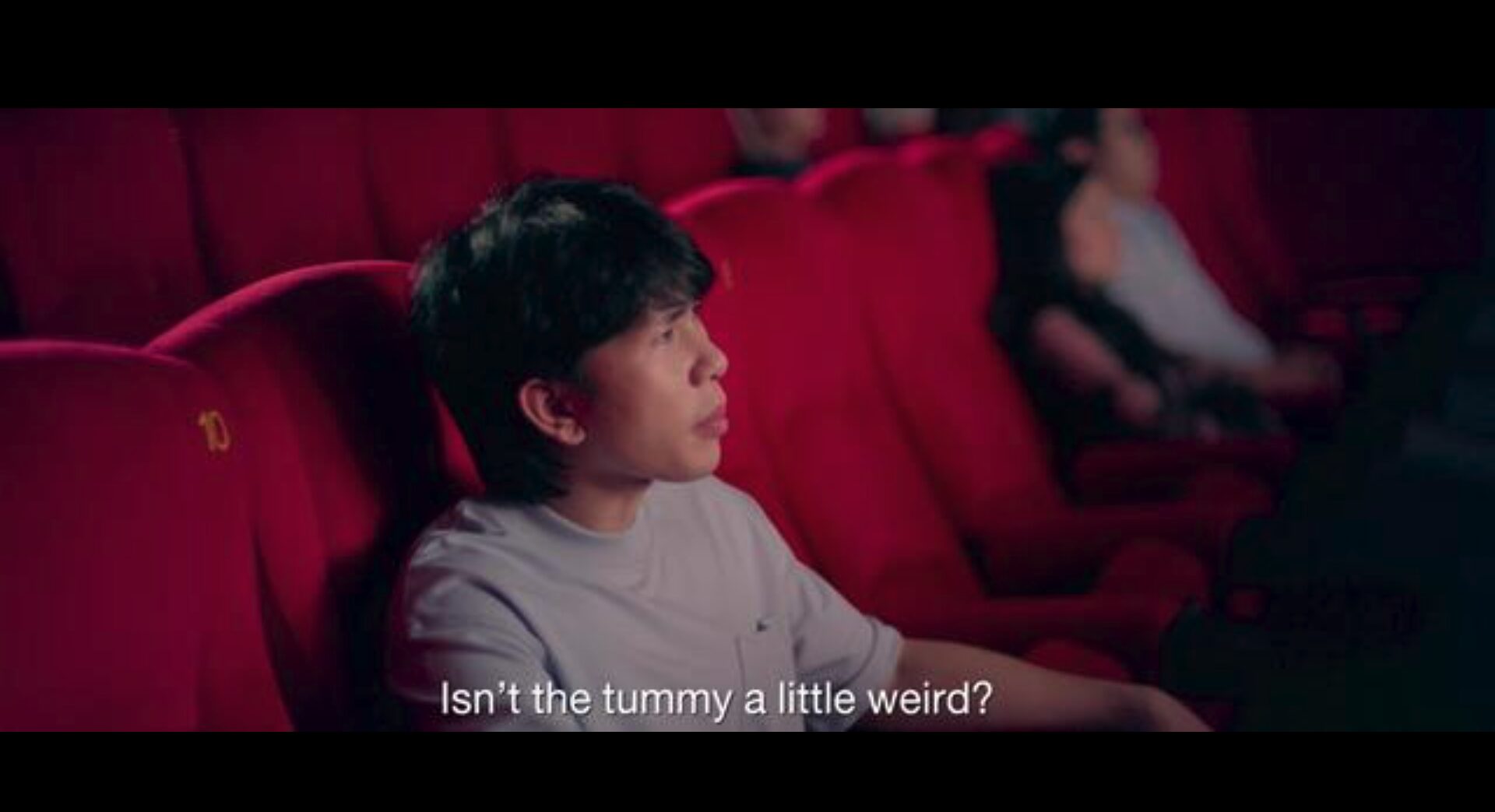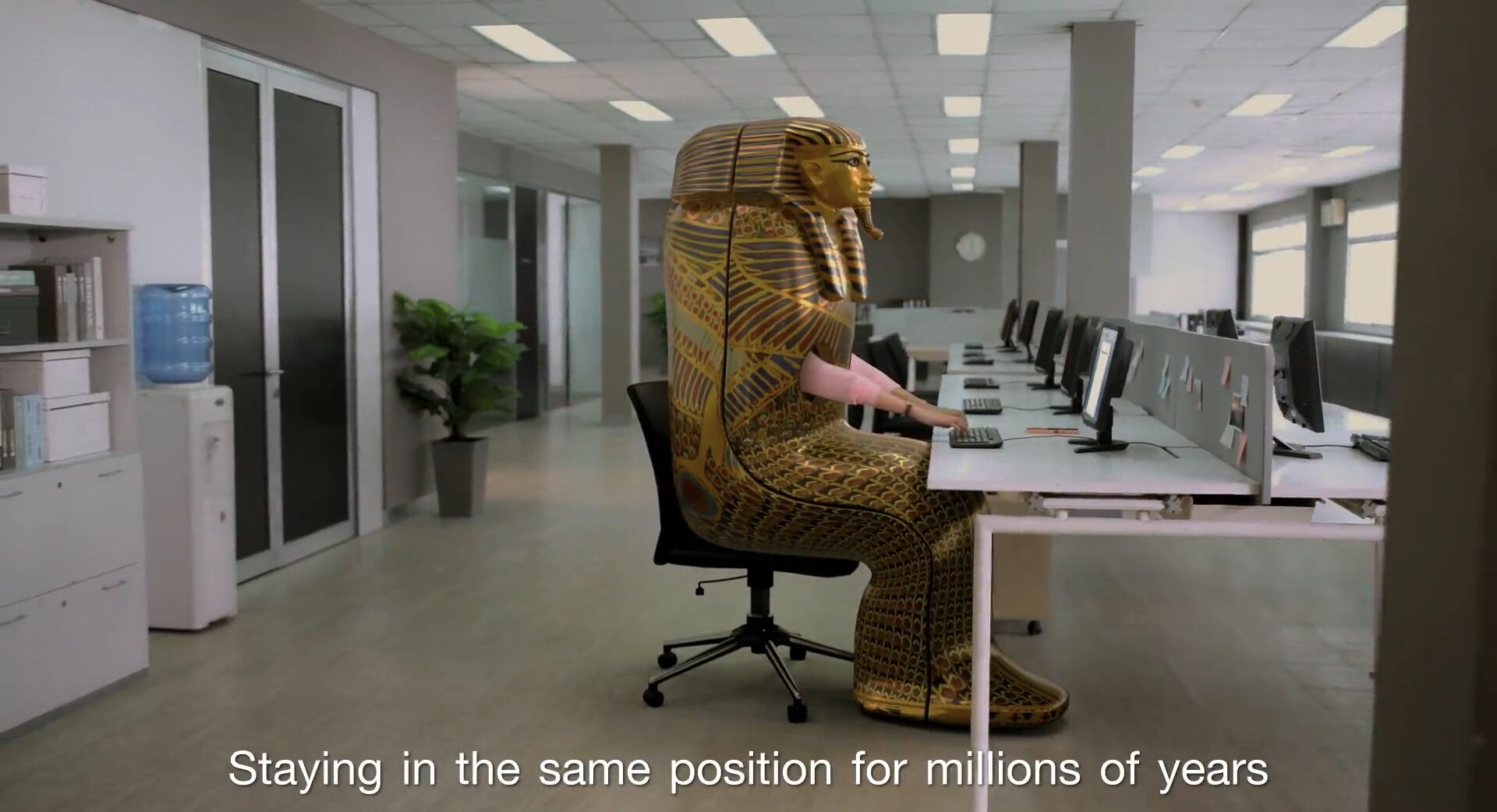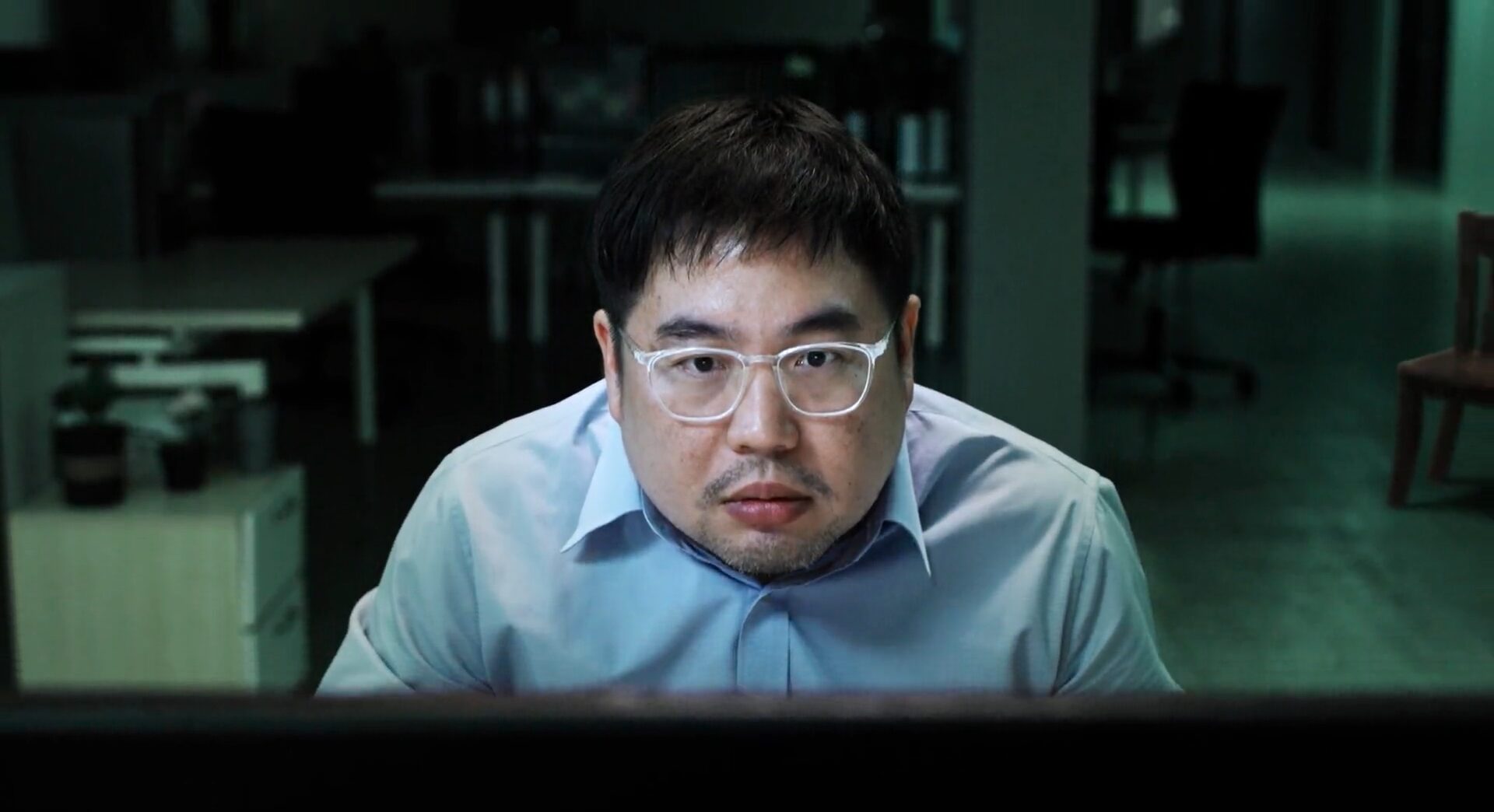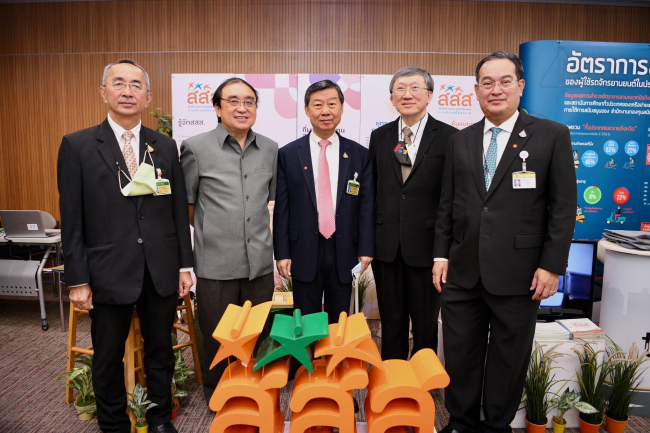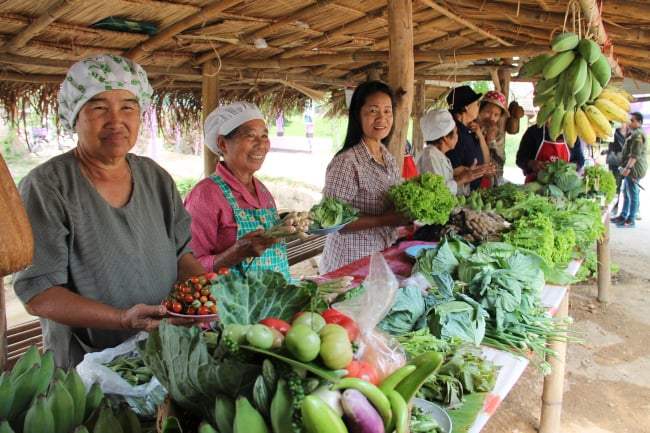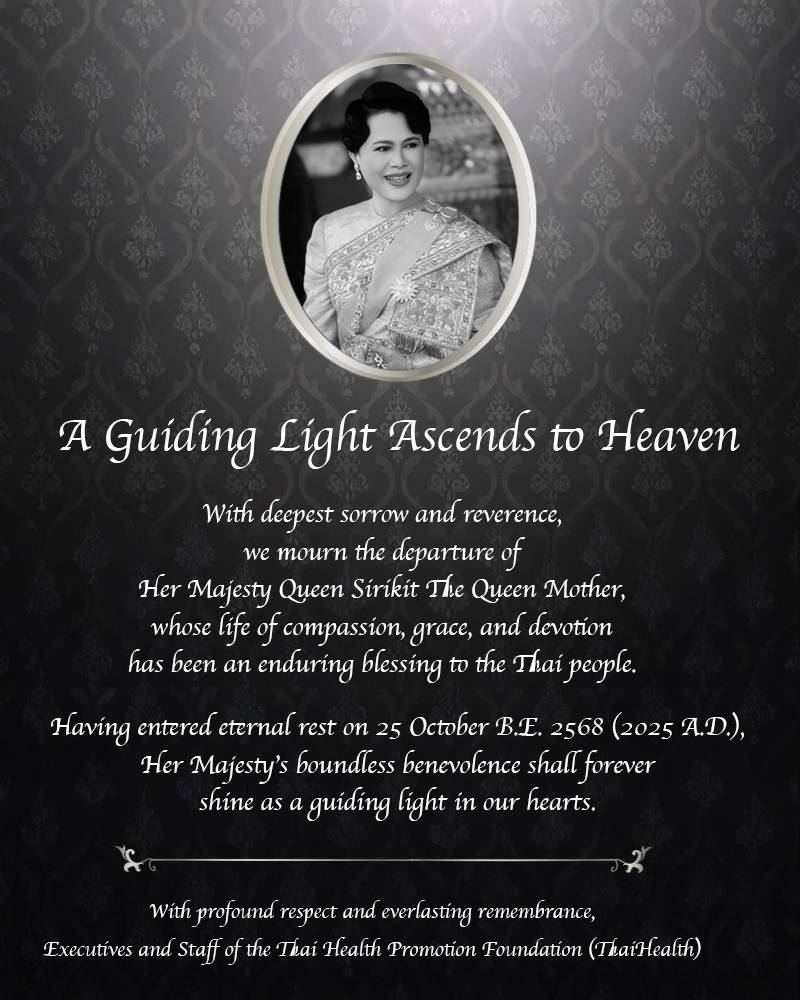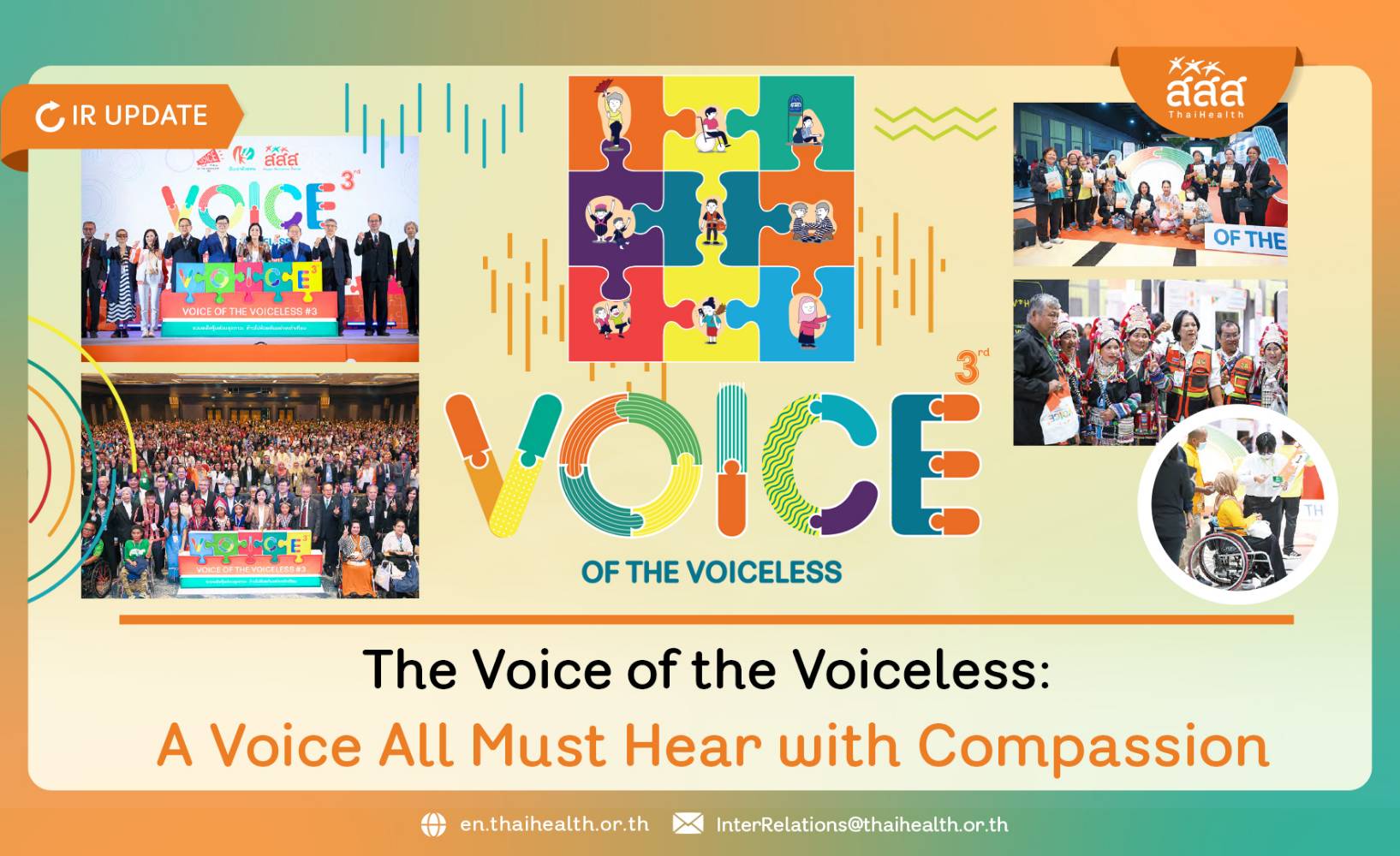
The Voice of the Voiceless: A Voice All Must Hear with Compassion
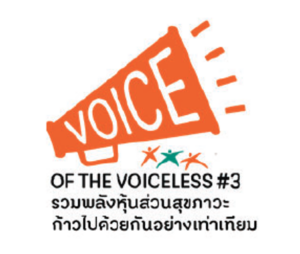
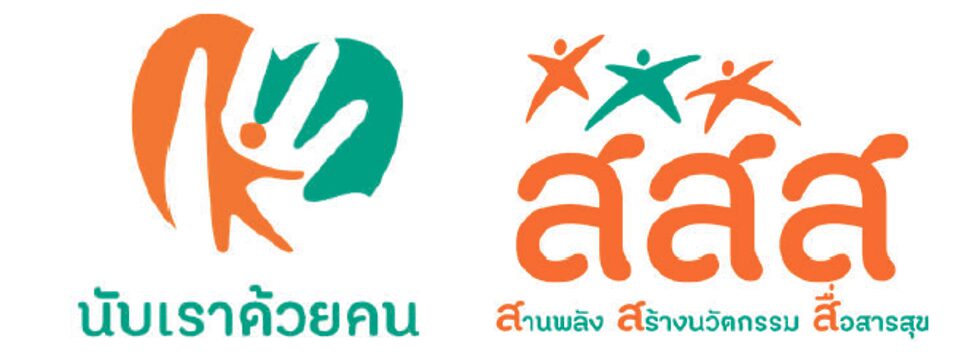
VOICE OF THE VOICELESS #3 Count Us In Synergize Efforts, Spark Innovations, Spread Well-being
Uniting Health Partnerships: Together in Equality

“Health Partnerships”
Understanding, Access, Equality
The Voice of the Voiceless: A Voice All Must Hear
with Compassion
Our society comprises different kinds of people, yet, regardless of status, everyone should enjoy the opportunity and the right to a good quality of life, with equitable access to basic necessities.
Over the past 14 years, ThaiHealth has joined hands with network partners to support nine vulnerable groups in reducing health inequalities among those populations:
“older persons, persons with disabilities, the homeless, informal workers, migrant populations, LGBTIQN+ individuals, prisoners, and Muslim communities.”
These populations are often neglected or overlooked, and their voices seek nothing more than equal opportunity, thereby contributing to policy change and eliminating marginalization that strips them of dignity and recognition in society.
The 3rd Academic and Knowledge-Sharing Conference, “Voice of the Voiceless: The Vulnerable Populations,” was held under the theme “Uniting Health Partnerships: Together in Equality.” ThaiHealth acted as a vital bridge to unite 4,000 participants from nine vulnerable population network partners in sharing insights and practical experiences.
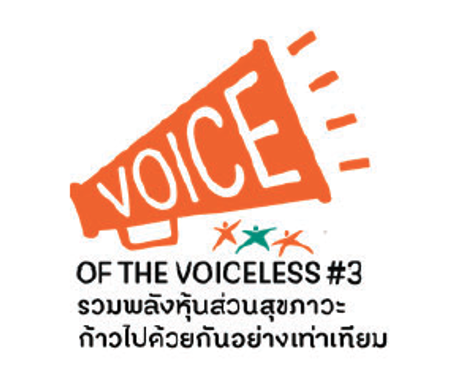
“Health partnership” means joining efforts to drive change, enabling vulnerable populations to access rights and welfare, thereby achieving equity systematically. This calls for collaboration among all sectors.
The event featured a forum to hear the voice of vulnerable populations, with relevant stakeholders joining to learn and listen. The forum aimed to enhance the capacity of the network partners, leading to policy proposals and systematic mechanisms to reduce health inequalities among those populations.
The past two gatherings have proven that uniting network partners working with vulnerable populations strengthens joint efforts while fostering reciprocal learning.
Creating spaces for listening allows the voices of the voiceless to resonate powerfully, bringing about change, such as the employment of persons with disabilities and improved access to healthcare, welfare, and public services for older persons.
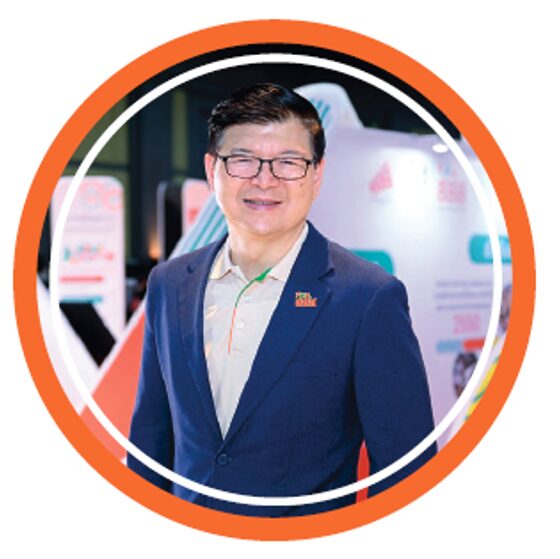
“What ThaiHealth envisions is a collaborative effort to ensure that voices are heard in society. We want the ‘voices’ of the vulnerable populations on health and well-being to be amplified, allowing society to understand what they need to achieve good health and well-being,” highlighted by Dr.Pongthep Wongwatcharapaiboon, CEO of the Thai Health Promotion Foundation (ThaiHealth).
Partnership means sharing a mutual understanding. It enables vulnerable populations to explore how they can take part in improving their health and well-being. As well-being involves both a right and a duty, society should recognize and hear their voices, and be willing to extend equitable health rights to those who remain disadvantaged in society.
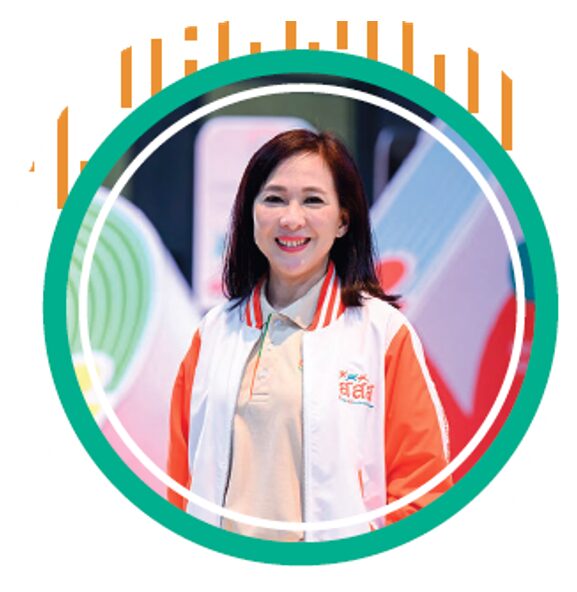
“Partnerships share five directions: 1. Respond to the voices of all groups with fair policies; 2. Reduce inequalities in health, welfare, and development systematically; 3. Jointly promote models and innovations; 4. Address bias and discrimination; 5. Build capacity and foster enabling environments for inclusive participation. All are aimed at advancing an equitable society where no one is left behind and all live in equality,” said Mrs.Poranee Poobrasert, Assistant CEO of ThaiHealth and Acting Director of Health Promotion for Vulnerable Populations Section, in noting the directions for work with vulnerable populations
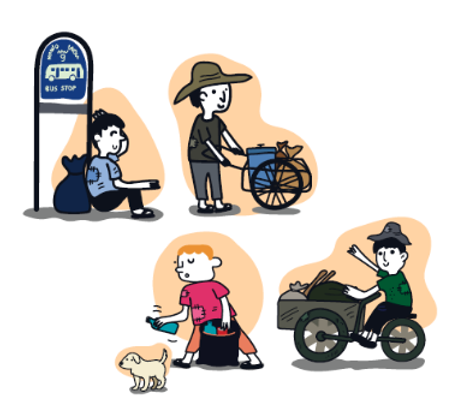
It may simply begin with attitudes, accessibility, structural issues, policy advocacy, and legal measures. At the same time, achieving good health and well-being is a duty shared by all.
This conference united those working toward this cause, offering a platform for reciprocal learning and amplifying the voices of vulnerable populations who are calling for the improved well-being of society.
“Bias,” once formed, does not
simply fade.
While it may be difficult, eliminating bias is possible. Asst. Prof. Sakol Sopitarchasak, Head of the Bias Research Project and Lecturer at the Faculty of Learning Sciences and Education, Thammasat University, noted, “When we live in a society where bias is shared, we are more likely to show it openly.”
At times, we may even be unaware of our own bias since bias is not inherently negative; it can emerge in the form of positive sentiment. For example, this study revealed that regarding the bias against older persons, Thais view those adults with “a sense of reverence on a pedestal,” believing that they should be cared for, remain at home, or engage only in age-appropriate activities such as temple visits.
In reality, in holding such views, we may be overlooking their needs. Just like anyone else, they may wish to do much more than visiting temples, such as riding big bikes, running a restaurant, or even having romantic relationships. However, they are often deemed unfit for such pursuits.
Similarly, persons with disabilities experience positive bias; people often feel sympathy or pity toward them rather than disgust or fear. People even choose to make charitable contributions to them due to a sense of pity. Such views foster the perception that persons with disabilities are inferior and always need help. As a result, when they behave or act outside of these expectations, it often raises doubt. This represents a form of bias in which we “label” others without realizing it.
One means of reducing bias is to establish an equitable social structure through “legislation” by defining bias or discrimination as an offence. For example, if a company declines to hire a candidate because of their identity as LGBTIQNA+, this constitutes a legal offence and the company would be subject to penalties. Laws can also be used proactively to promote equality for all.
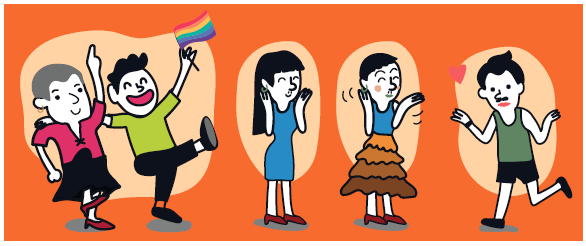
“Take the Marriage Equality Act, for example. Simply enacting legislation that allows people to marry can lessen policy-level discrimination. Passing legislation that creates opportunities for minority groups can elevate their social status, which could, in turn, reduce societal bias.”
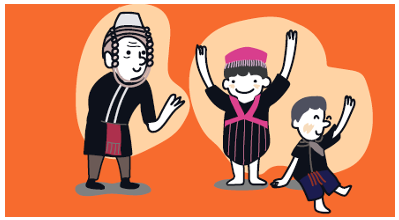
The same applies to laws that protect the rights of other vulnerable populations, such as the draft Ethnic Groups Act, which is currently under way. Once this law is passed, prejudice against ethnic groups may be reduced.
Establishing “shared public spaces” is a tangible approach to lessening the divides among people in society.
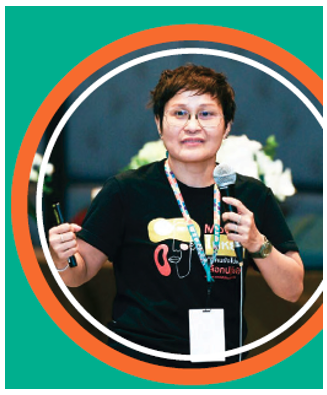
Ms.Jarunee Siriphan of the Foundation for Action and Inclusion Rights (FAIR) and the People’s Network for the Elimination of Discrimination (MovED)
Amplifying the voices that have been unheard—or never heard—is integral to achieving equity for every group in society. Though it is no easy task, driving change with understanding can gradually reduce various forms of inequalities.
The concerted efforts among network partners advocating for vulnerable populations are crucial since they allow for greater reach to intersecting groups, such as LGBTIQN+ older adults or older persons with disabilities.
Therefore, this conference was more than a forum for knowledge sharing; it was about uniting efforts to tackle multiple forms of inequalities.
Five Voices of Health Partnerships
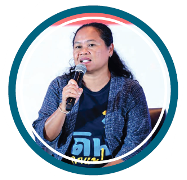
Voice of Civil Society
Ms.Wanna Kaewchat,
Representative of the Human Settlement Foundation and Board Member of the National Health Security Office (NHSO)
Addressing inequalities among vulnerable populations is no simple task. For example, some may assume that the issue of “stateless Thais” is straightforward as it simply involves applying for an ID card at the district office. Yet, encouraging people to do so is far from simple, especially without knowing the hardships they have experienced. I believe that if each organization contributes to this endeavor based on its capacity, without placing blame on one another for obstacles, they can drive change more effectively.
It is about working as equals, showing mutual respect, and ensuring that civil society is not left behind. For instance, academic research should use accessible language so as not to exclude those wishing to raise their voices. Otherwise, they will not be empowered to speak up, leaving their voices unheard.
“To amplify the voices of vulnerable populations, everyone must speak up, and listeners must pay close attention, ensuring that their voices have been truly heard and addressed, and uniting efforts to empower them and bring about sustainability.”
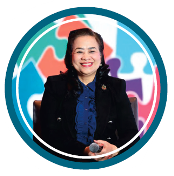
Voice of the Public Sector
Mrs.Jatuporn Rojanapanich
Deputy Permanent Secretary, Ministry of Social Development and Human Security (MSDHS)
The MSDHS is committed to fostering social development to ensure well-being, a good quality of life, and security in life. More importantly, its priorities include rights and opportunities, access to social welfare, and equality. In the face of lower birth rates, an ageing population, and a declining workforce, the Ministry has recognized the need to adapt and work more proactively.
“To address social inequalities among vulnerable populations, we are striving to establish an equitable welfare state that covers both individuals and families. While we used to work by age groups, we have integrated a “family” model within and outside the Ministry. Rather than seeing people as children, persons with disabilities, or older persons, we view them as one family, and we are drawing on data to design welfare services more precisely.”
We are grateful to ThaiHealth for empowering us to adopt an innovative approach beyond the conventional government approach. In this partnership model, while differences exist, we have a shared goal of ensuring people’s well-being. With each agency contributing its resources, we can realize the shared vision of an improved quality of life and well-being for all.
Voice of the NESDC
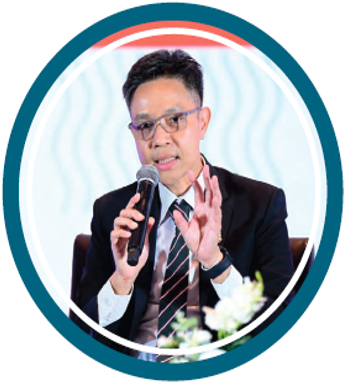
Mr.Vitphiphon Tivatansaku, Senior Advisor in Plan and Policy
Office of the National Economic and Social Development Council (NESDC)
The NESDC operates at three levels. The first is the National Strategy, which focuses on vulnerable populations, addressing inequalities, advancing social equality, and enhancing human capacity. The second is the Master Plans under the National Strategy, comprising three master plans: lifelong human development, social empowerment, and equality and social security. With the 14th plan soon to conclude, we call on all parties to share insights for a more inclusive plan. The third level involves ministry-level operations.
The NESDC also conducts fieldwork and has proposed four recommendations: 1. Establish social mechanisms to support vulnerable populations; 2. Empower local administrative organizations (LAO) to manage welfare services efficiently; 3. Develop participatory community databases; and 4. Establish guidelines or criteria for budget allocation.
Voice of the National Human Rights Commission of Thailand

Mr. Panupun Som-skul, Advisor, Office of the National Human Rights Commission of Thailand (NHRC)
The NHRC, an independent constitutional body, not only protects the rights established in the Constitution but also upholds universal human rights principles. It has three primary functions. The first involves protecting human rights by investigating complaints of violations and recommending fair remedies to the government and relevant agencies. Given that many issues stem from laws that impede access to rights, the NHRC focuses on reforming these laws to align with the present context. The second function is
promoting cooperation by working with all partners to foster public awareness of human rights. Finally, the NHRC monitors the situations of different population groups and submits annual reports to the government, Parliament, and the public on persistent barriers to human rights access faced by those population groups.
The NHRC will serve as a link between the state and the public, seeking to prevent human rights violations and ensure fair and equal access to human rights. It will also be a public voice, bringing light to problems faced by different population groups, pinpointing the gaps in current policies and government functions, and highlighting actions needed to address them.
Voice of International Cooperation Agencies
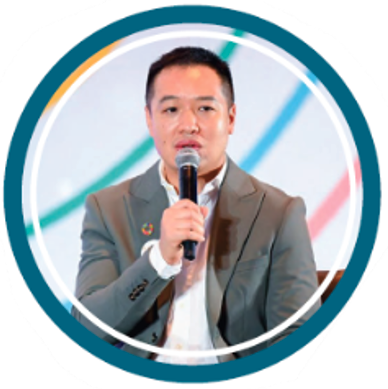
Mr. Atipat Worangkanan, Population and Development Program Analyst, United Nations Population Fund (UNFPA) Thailand
The UNFPA works closely with government and civil society partners and has developed a digital solution. Funded by ThaiHealth, the So Safe service—accessible by adding the LINE account @sosafe—allows users to report social problems via chatbot. Reports are sent to relevant authorities without the need to fill out forms or visit an office.
These are the five voices of the five health partnerships committed to addressing inequalities for vulnerable populations. They highlight that uniting efforts is integral to amplifying the voices of these groups, enabling systematic and sustainable solutions, and advancing together with equality.


